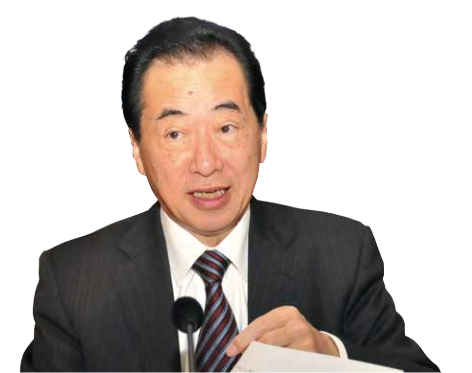Issue:
The former PM rules out a “grand coalition” with fellow former PM Koizumi to do away with nuclear energy, but vows to continue his own campaign

Speaking at a luncheon at the FCCJ on Dec. 12, former prime minister Naoto Kan repeated his support for another former prime minister Junichiro Koizumi in opposing Japan’s reliance on nuclear power. This is a controversial position for Koizumi, given that the Liberal Democratic Party that he headed for so many years is so committed to restarting the nation’s mothballed reactors.
Asked if he might put aside his Democratic Party of Japan affiliations to team up with Koizumi, Kan replied that he believes both politicians “can be more effective separately.”
“If we were to collaborate, then people would get suspicious. [Prime Minister Shinzo] Abe and the LDP would say that he had strayed from the party,” Kan said. In the same vein, Kan believes he would be accused of “snuggling up” to Koizumi by many in the DPJ.
Prime minister on March 11, 2011, when the Tohoku earthquake and tsunami struck northeast Japan, triggering the second-worst nuclear accident in history at Fukushima, Kan stepped down in August of that year and has since traveled the world promoting his vision of a world that no longer requires nuclear energy.
Even though he is no longer in government, having been deposed after the DPJ suffered a collapse in the general election of December 2012, Kan con-tinues to push his belief that mankind cannot completely control nuclear energy that we therefore need to harness power from renew-able sources to ensure our future. Many people in Japan share that opinion, he believes, including a substan-tial proportion of LDP members in the Diet. But they are being prevented from speaking their minds, he charges.
“I would say that more than 50 percent of LDP members share my position on nuclear energy,” Kan said. “And if that is so, I hope to be able to encourage them to express their thoughts in public.”
He singled out Taro Kono and Seiichiro Murakami, both of whom are long-standing and fairly senior members of the party, for having spoken against Japan’s reliance on nuclear energy, in defiance of the LDP’s official line. The others, he says along with the vast majority of the media, academics, regional leaders and Japanese society at large have been cowed by all-pervasive power of the companies, politicians, industrial bodies and other vested interests that make up the “nuclear village.”
“To me, the reason they say nothing is quite clear,” he said. “It is the influence of the ‘nuclear village,’ which means that anyone who speaks out against nuclear energy comes face-to-face with a system that stops them from rising through the ranks of their organization.”
Kan firmly believes that Abe is part of the problem, and has started legal action against the prime minister for comments made on his personal blog during the campaign for the 2012 election. In the comment, Abe accused Kan of intervening on March 12, the day after three reactors at the Fukushima Daiichi plant were crippled, to overrule engineers at the plant and halt the use of seawater to cool the overheating reactor vessels.
The message on Abe’s blog demanded that Kan apologize to the people of Japan for threatening their safety, and that he resign. The following day, the right-wing Yomiuri and Sankei newspapers printed stories based on Abe’s comments, further reinforcing his accusations.
The message on Abe’s blog demanded that Kan apologize to the people of Japan for threatening their safety, and that he resign. The following day, the right-wing Yomiuri and Sankei newspapers printed stories based on Abe’s comments, further reinforcing his accusations.
“What was written was very different from the truth,” Kan said. “Official reports by the government and Tepco since then confirm this did not happen. I never gave an order for the seawater to stop being used.”
Kan has determined that other media received the same information from Tepco sources, but they checked the facts and decided there was no story; the Yomiuri and Sankei, however, decided to continue to support the LDP’s line, he said. “This is what happens if you speak out against the nuclear village,” Kan said. “If you are a local politician, a prefectural governor or even the prime minister, they can drive you out of office.”
Kan has asked Abe to remove the incorrect claim from his website on “repeated” occasions,” he said, but nothing has happened. He has since filed defamation charges and court proceedings have begun.
In the meantime, he continues his antiuclear crusade, as resisting the return of nuclear power has become his sole aim in politics, he said. “I was recently in Hakodate, in Hokkaido, to take part in a meeting of people opposed to the restart of the Oma nuclear plant; after that I went to Ikata to speak to people in Ehime Prefecture about the reactors there,” Kan said.
“I am trying to increase the network of citizens who are speaking out against nuclear power. And when I meet the people in the towns where these reactors are based, I see just how many voices are against the plants,” he said. “That makes me think it will not be possible for the government and the power companies to go over the heads of the people and forcibly restart the plants.”
Julian Ryall is the Japan correspondent for The Daily Telegraph.

